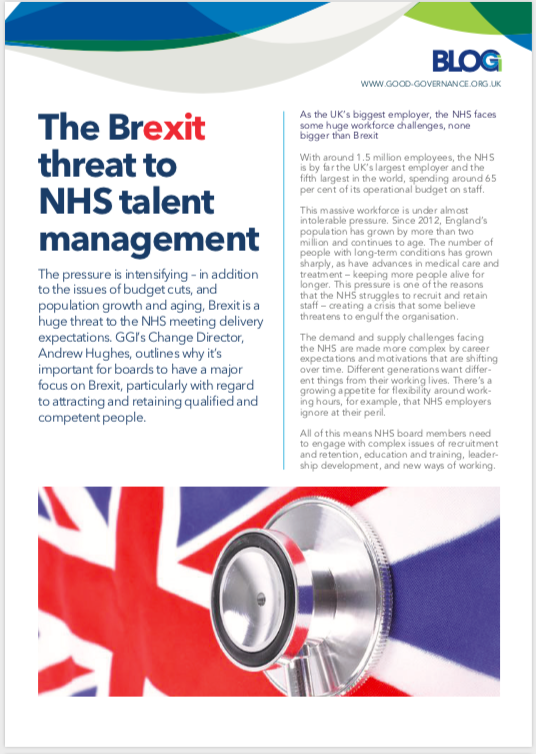The Brexit threat to NHS talent management
13 August 2019
The pressure is intensifying – in addition to the issues of budget cuts, and population growth and aging, Brexit is a huge threat to the NHS meeting delivery expectations. GGI’s Change Director, Andrew Hughes, outlines why it’s important for boards to have a major focus on Brexit, particularly with regard to attracting and retaining qualified and competent people.
As the UK’s biggest employer, the NHS faces some huge workforce challenges, none bigger than Brexit
With around 1.5 million employees, the NHS is by far the UK’s largest employer and the fifth largest in the world, spending around 65 per cent of its operational budget on staff.
This massive workforce is under almost intolerable pressure. Since 2012, England’s population has grown by more than two million and continues to age. The number of people with long-term conditions has grown sharply, as have advances in medical care and treatment – keeping more people alive for longer. This pressure is one of the reasons that the NHS struggles to recruit and retain staff – creating a crisis that some believe threatens to engulf the organisation.
The demand and supply challenges facing the NHS are made more complex by career expectations and motivations that are shifting over time. Different generations want different things from their working lives. There’s a growing appetite for flexibility around working hours, for example, that NHS employers ignore at their peril.
All of this means NHS board members need to engage with complex issues of recruitment and retention, education and training, leadership development, and new ways of working.
Does Brexit spell disaster?
Brexit will have a multi-faceted impact on the NHS – much of it still frustratingly hard to pin down. Access to medicines might be affected. Collaborative research might suffer. It could become more difficult for the UK to take part in clinical trials. The UK’s involvement in European Reference Networks for rare and complex diseases, currently involving around 40 NHS hospitals, might be jeopardised. And there could be dangerous delays in EU-wide public health early warning and response systems.
These are all significant issues, but the biggest Brexit impact of all is likely to be workforce-related. The NHS has long been reliant on EU workers, with around 10 per cent of its doctors and five per cent of nurses currently from the EU. Add social care roles and the total rises to more than 160,000 EU/EEA nationals working in the sector. In an age when many NHS trusts are struggling to fill vacancies, Brexit could be disastrous.

Recruitment and retention
There is no reliable data on vacancy levels across the NHS, but the Nuffield Trust used published vacancy advertisements to calculate that there were around 94,000 full-time equivalent vacancies in hospital and community services alone between July and September 2018. That’s an estimated shortfall of one in 12 posts across the service. NHS trusts fill many of these vacancies with agency staff but that represents a huge drain on limited resources and brings with it the risk of poor continuity of care.
A recent briefing by The King’s Fund, the Health Foundation and the Nuffield Trust suggested that NHS workforce shortages could turn the NHS Long Term Plan into nothing more than an unachievable wish list. It warns that these shortages could lead to growing waiting lists, deteriorating care quality and the risk that some of the money pledged for frontline services will go unspent.
An existential threat?
The multifaceted challenges related to staff recruitment and retention, talent management and leadership development threaten to engulf the NHS completely, according to Nigel Edwards, Chief Executive of the Nuffield Trust.
To prevent that happening, board members must fully engage with these issues and do everything in their power to address them in ways that are as inclusive and compassionate as they are effective.


